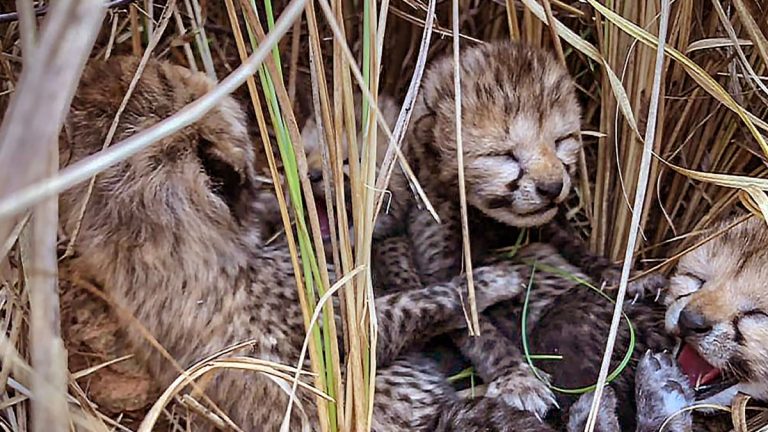
Eight of 20 adult cheetahs flown in shipping crates from Namibia and South Africa have died in the past two years. (PTI/Document)
The Cheetah Project is still on track to procure 8-12 big cats from African countries each year. Since the wildlife experiment began in September 2022, eight adult cheetahs have died in Kuno National Park.
A high-level delegation from India was due to visit South Africa this week to discuss the transfer of the next batch of cheetahs, but that has been postponed. Just days ago, the body of a lone free-ranging male cheetah, Pawan (Oban), was found near a creek in Kuno National Park, taking the cheetah casualties to eight.
A delegation led by officials from the Ministry of Environment, Forests and Climate Change (MoEFCC) and the National Tiger Conservation Authority (NTCA) is scheduled to embark on a four-day visit to the African country. The two countries signed a Memorandum of Understanding (MoU) in January 2023 on cooperation on cheetah reintroduction, India's largest large carnivore wildlife experiment.
“We have to introduce about 8 to 12 cheetahs every year to ensure a viable mixed population in India. We reintroduced eight in Kuno last February and plan to introduce the next batch soon. This is a long-term Project. South Africa and Kenya are both under consideration,” said Dr Gobind Sagar Bhardwaj, ADGF (Project Tiger) and Member Secretary, National Tiger Conservation Authority (NTCA).
The massive project, which launched in September 2022, has been criticized for a spate of cat deaths in Kuno National Park, but more cheetahs are still expected to be found. Eight of 20 adult cheetahs flown in shipping crates from Namibia and South Africa have died in the past two years. The remaining 12 were recaptured last year and returned to large pens where these critically endangered wild animals are kept in captivity.
The Indian delegation, consisting of wildlife experts, also plans to study South Africa's captive breeding program and its further maintenance, and meet with the South African Department of Fisheries, Forestry and Environment (DFFE) to discuss translocations. The visit may be rescheduled in the coming months.
Meanwhile, News18 has learned that ground talks with Kenya are also underway. The East African country, which nearly straddles the equator, was considered because part of it, like India, is in the northern hemisphere — and some experts believe India's cheetahs may be better suited to adapt to Indian conditions due to synchronized seasons. However, no country has finalized it yet.
The next batch will be taken to Gandhi Sagar Sanctuary
Plans are now underway to reintroduce the next batch of cheetahs to the Gandhi Sagar Wildlife Sanctuary in Madhya Pradesh, where arrangements are being made for the reintroduction. The Madhya Pradesh Forest Department has been increasing the number of game animals (cheetahs, etc.) at the site to cater to the needs of African cheetahs and has put up a fence in a part of the area.
The government's Operation Cheetah plan proposes moving 12 cheetahs per year over the next eight to 10 years to restore the country's population – which could take up to 25 years. The reintroduced African cheetah is not the same Asian subspecies as the cheetah in India some 70 years ago. So far, Kuno's beasts have spent more time in captivity than in the wild. Just as the forest department was preparing to release the cheetahs after approval from the Cheetah Project Steering Committee, they found a lone free-ranging Namibian cheetah – Pawan (Oban) – dead near a creek.
